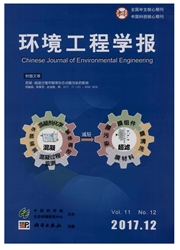

 中文摘要:
中文摘要:
热强化气相抽提技术(T-SVE)在修复半挥发性石油烃污染土壤方面极具应用潜力。本文基于实验室模拟T-SVE装置,研究了加热温度及土壤含水量、有机质对4种半挥发性石油烃(正十三烷、正十四烷、正十五烷和正十六烷)去除效率的影响,并对石油烃去除动力学进行了拟合。结果表明,温度决定性地影响了石油烃污染土壤的修复效率,污染土壤残留率与加热温度基本呈反比。石油烃去除过程符合Elovich和Freundlich热脱附动力学方程。加热温度为140℃时,土壤含水量(5%-30%)的增加降低了石油烃去除效率;当温度上升到180℃,石油烃去除率在土壤含水量5%-20%时也表现出降低趋势,但在土壤含水量为30%时反而达到最高值。土壤有机质含量增加明显降低了石油烃去除率,尤其对于辛醇-水分配系数值高的石油烃;当加热温度从140℃升高到220℃,土壤有机质对石油烃污染去除的限制明显降低。实验获得结果可为T-SVE技术修复石油烃污染的工程设计提供参考。
 英文摘要:
英文摘要:
Thermal enhanced soil vapor extraction( T-SVE) is a superior alternative technology to remediate soils contaminated by semi-volatile petroleum hydrocarbon. In this study,the effects of heating temperature,soil water,and organic matter content on the remediation efficiency of soil contaminated by four kinds of semi-volatile petroleum hydrocarbons( n-tridecane,n-tetradecane,n-pentadecane,and n-hexadecane) were evaluated based on a laboratory-scale device simulating the T-SVE process. The removal kinetics of these petroleum hydrocarbons was simulated. The results indicated that the heating temperature crucially affected the remediation efficiency of petroleum hydrocarbon-contaminated soil,in which the heating temperature and soil residual rates are inversely proportional to each other. The removal processes of tested petroleum hydrocarbons were well fitted by the thermal desorption kinetic equations of Elovich and Freundlich. At 140 ℃,the soil residual rates of the tested petroleum hydrocarbons were elevated with an increase in soil water content from 5% to 30%. At 180 ℃,the increasing tendency was also observed at soil water contents of 5% to 20%,while the soil residual rates of the tested petroleum hydrocarbons reached a maximum at a soil water content of 30%. The elevated soil organic matter content resulted in an obvious decrease in the removal efficiency of petroleum hydrocarbons,especially for those with a higher octanol-water partition coefficient. The restriction effect of soil organic matter on the removal of petroleum hydrocarbons clearly decreased when the heating temperature was increased from 140 ℃ to 220 ℃. The obtained results can provide a reference for the industrial design of T-SVE for the remediation of soils contaminated by petroleum hydrocarbons.
 同期刊论文项目
同期刊论文项目
 同项目期刊论文
同项目期刊论文
 期刊信息
期刊信息
